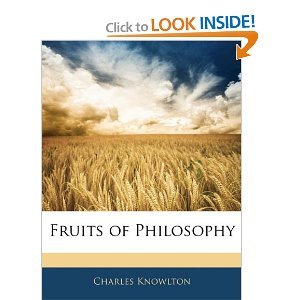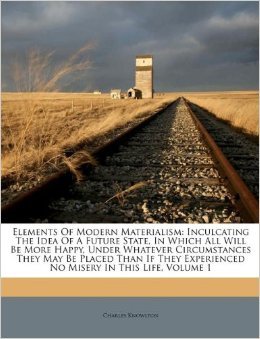
In 1800, Charles Knowlton, M.D. was born in Massachusetts. Freethinkers pioneered the movement to prevent unwanted pregnancies, and Knowlton was one of the earliest of the freethought reformers. He earned his medical degree from Dartmouth College in 1824. He became an ardent foe of the influence of Christianity, writing Elements of Modern Materialism (1829), in which he identified himself as an "infidel." The book challenges the religious dualism of body and spirit, and Knowlton presents a psychological theory that’s been described as “early behaviorism.” Fruits of Philosophy; or, the Private Companion of Young Married People (1832), tackled the subject of birth control before that term existed. Knowlton dispassionately made the case for preventing conception, and promoted a syringe-administered douche. The first edition was anonymous. The book was published in nine U.S. editions, and was reprinted by subscription by a group of doctors at Harvard Medical School in 1877. In the summer of 1829, he took a “one-horse load” of books down to New York city. He failed to sell any, but probably visited local freethinkers like Robert Dale Owen. Knowlton named his second son Stephen Owen, after his father and his friend.
Dr. Knowlton was prosecuted and fined at Taunton, Mass., in 1832, and was sentenced to three months' imprisonment at hard labor in the House of Correction in Cambridge in December 1832. He went directly from jail upon his release to a freethought society in Boston run by Abner Kneeland, where he delivered "Two Remarkable Lectures," referring to superstition as the "moral monster." He was unsuccessfully prosecuted in Greenfield, Mass., at the instigation of a minister. Knowlton's groundbreaking work was reprinted in England by various freethought publishers. British atheists Charles Bradlaugh and Annie Besant republished it in 1877 to challenge the Obscene Publications Act. They were prosecuted and tried, narrowly avoiding jail. The case shot the book's circulation from a thousand a year to a quarter million in England. Besant rewrote the dated text into Law of Population in 1879, which became a bestseller and helped to hasten the birth control movement worldwide, but lost her custody of her daughter. Knowlton was considered one of the leading freethinkers of his era. He was a delegate at the Convention of the Infidels of the United States, meeting in New York City in 1845.



